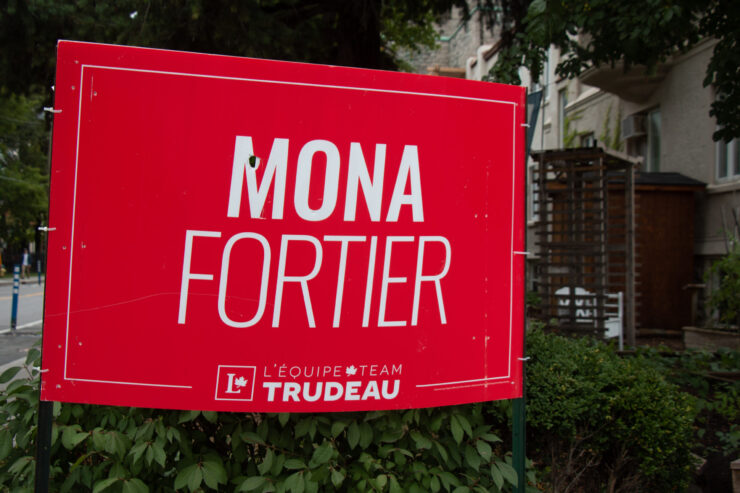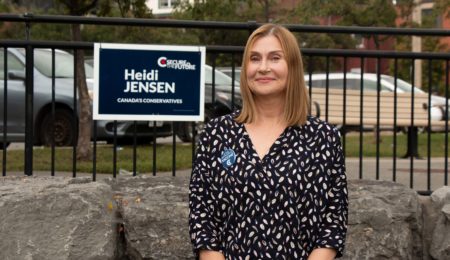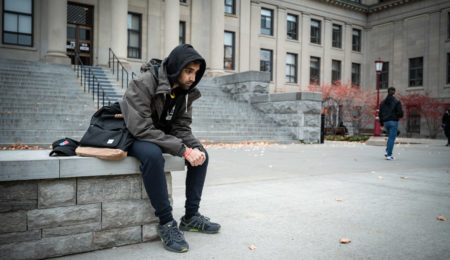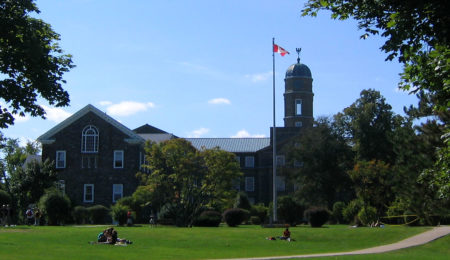Ottawa-Vanier Liberal party Candidate Fortier speaks on climate change, health care, housing, and pandemic recovery
This interview is part of The Fulcrum’s series of articles profiling the Ottawa-Vanier candidates for the upcoming federal election on Sept. 20. Candidates were asked questions based on the issues and concerns of University of Ottawa students. Answers have been edited for length and clarity. The inclusion of opinions expressed by candidates in this series are not endorsements by the Fulcrum
Mona Fortier is the Liberal party’s candidate in Ottawa-Vanier and is looking to defend her seat, which she has held since 2017. The Liberal Party has had a hold on the riding since its creation in 1935 (known at the time as Ottawa-East).
Fortier was born and raised in Ottawa and is an alum of the University of Ottawa, where she studied sociology before pursuing a Master’s in business administration. She started her own business and spent many years as an outreach and communications specialist before joining the team at Collège La Cité. She then returned to consulting work before running for public office in 2017.
Fortier has also taken part in grassroots organizing and has sat on the board of directors for several non-profits and Montfort Hospital. She is currently the Minister of Middle Class Prosperity and Associate Minister of Finance. Fortier is also a mother of three.
The Fulcrum: What compelled you to run for office initially and why did you choose to do so with the Liberals?
Mona Fortier (MF): From high school, I was engaged as a youth activist for official language rights — Francophone rights in a minority setting — but also for the community, making sure that youth had a voice in decisions made by elected officials, and making sure that on the municipal, provincial, and federal sides that youth were part of being able to make a difference, and that’s where I got hooked on not only partisan politics, but especially getting involved in my community. I’ve been involved for 25 years with the party, at first as a Young Liberal, and then I decided to get engaged with the Ottawa-Vanier Liberal Association. I was also very involved in the community as an influencer for Francophone rights. So that’s how I got hooked on that, knowing that you can influence different policies through being engaged in the community. And then I got the privilege of running in 2017.
I can tell you that many of my high school friends knew that someday I would get there. My school yearbook, many had signed it ‘one day, we’ll see you in Parliament.’
The Fulcrum: Could you tell me a little bit about how students stand to benefit from the Liberal platform and your ideas in particular?
MF: Sure. First, I’d like to say that we know students and youth got really hit hard during the pandemic. And that is something that we recognized at the beginning of the pandemic and made sure to bring opportunities and support for youth and especially students, with the Canada Emergency Student Benefit (CESB) last year, which helped many students get through the summer. And now, to continue that support, I would say there are four different measures that I’d like to raise.
The first one is about student loans. As you know, student loans are something that many students have, and we have decided to permanently eliminate interest fees for student loans. And I think that will make a big difference for students. Also, we’re really focusing on green jobs. We’re talking about inclusive green job transition, and that is something where we are going to focus on for students from re-skilling to skilling, students and graduates. Another one that is really important is childcare. Many people have kids when they go to study, and the early learning and childcare program we’re proposing would cut the fees for the first year by 50 per cent, and over five years would get to $10 a day. That will make a big difference for many who have families that are studying. And then the other big one is mental health. I mean, you probably know that students have raised how this is a very difficult time with the pandemic. A lot of anxiety out there. So mental health supports are key and a priority in our platform.
The Fulcrum: The Liberal platform lists publicly accessible mental health care as a point under the healthcare section. Can you tell me a little bit more about how the Liberal party plans to improve the accessibility of mental health care?
MF: So I would say there are two things. First, the fact that we would offer permanent transfers to provinces and territories — so in our case, it would be with the Government of Ontario — and that will help in terms of focusing on mental health supports and health care. I would also mention that the Wellness Together portal, which we launched during the pandemic, is another tool that has been used, and actually, students have thanked us for having that opportunity. I spoke with the Canadian Federation of Students (CFS) last year because I was consulting different student bodies to understand where the needs were and they had raised mental health, and we’re hoping that we would increase the funding to make sure the Wellness Together portal would be accessible and offering those services. So we replied in the budget and we are going to continue that into the next phase.
One thing I should have mentioned, which is really important, is we do have a lot of BIPOC students and Indigenous youth in our different institutions. They have raised that there are special needs, and again, through mental health care that will be provided into the package when we negotiate with the provinces.
The Fulcrum: Many students and their parents were recipients of the student benefit and of the Canadian Emergency Recovery Benefit (CERB). I’d love to know what the future of those programs will look like if the Liberal Party is reelected?
MF: So that was during the pandemic, we had many emergency measures to support during the pandemic. I would say that now we’re transitioning to targeted investments in sectors that were most hit like tourism, hospitality, arts, and culture. And through that, there will be some support for all Canadians working in these hard-hit sectors, so students will benefit through those measures. I should also mention that the Workers Recovery Benefit will be extended until I believe it’s March 2022.
Yeah. And the other thing that we have right now is CRB, the Canadian Recovery Benefit, that lasts until October, where you can get $300 a week for a maximum of 54 weeks. So I know that some students have benefited from it, but it’s not targeted only to students.
The Fulcrum: For many university graduates, it’s been difficult to find employment, in part due to the pandemic but of course, that’s in part been a long-standing issue. How do the Liberals plan to reduce unemployment for the 20-to-30-year-old, college-educated demographic?
MF: Again, I would probably focus on the fact that we’re developing the Workers Recovery Benefit as a measure to support students and youth because there are major labor gaps in some sectors. Employers are looking for employees, and we’re trying to facilitate that match. And green jobs, I’m going to repeat that. Climate change is such a really big part of our platform. And students and youth are the ones that will be able to really contribute to that.
The Fulcrum: Like you said, students and youth are particularly concerned about the climate crisis. And so I’d love to ask you a bit about climate policy. First of all, what is the Liberal Party’s plan to move towards greener energies and divest from fossil fuels?
MF: So first, we have a very ambitious goal, targets that we announced in June of [reducing emissions] between 40 and 45 per cent, which was initially 36 per cent. There is a portfolio of green measures that we’re bringing forward, such as not only reducing plastics, but also eliminating plastic [waste] by 2030. Making sure we have the electric vehicles and the ecosystem in our country for them. So everything from getting batteries to building cars in our own country, and also making sure that we have 50,000 new charging stations. So we’re really investing into the electric vehicle strategy. We are focusing on conservation of nature, and on green transitions. So reducing fossil fuel grants to eliminate them by 2023 instead of 2025. So those are examples of our portfolio of measures to be able to reach our targets. And maybe also with all of the efforts Canadians will be doing, we could surpass those targets.
We’re very ambitious. And you know, we’re already on track to getting there. It’s clear that O’Toole wants to go back to the Harper years with a goal of [reducing emissions by] 30 per cent. But we’re already at 36 per cent. We’re on track. And I believe that if all Canadians decide to continue and work together, we could surpass those ambitious goals that we set.
The Fulcrum: Obviously climate change is an issue that affects the entire country and the entire world, but for Ottawa-Vanier in particular, what kind of climate action do you think we can see on the constituency scale?
MF: Well, that’s a great question. First, we have to demonstrate that the LRT has been one aspect that we’ve been investing in since 2016. We’ve invested in electric buses, and we need to continue those electric buses investments to change our fleet. And then also, in Ottawa-Vanier, we have many opportunities to continue to invest into our active transportation, multi-use transportation, from widening sidewalks, making sure we have bike lanes, and, you know, introducing ways for Ottawans to use the active transportation, that’s something that I’m focusing on. And also, we have the Ottawa River. Those are also investments that we are going to focus on, like the river house I’m working on. Hopefully, we will be able to support them and continue not only the education, but also the river keepers’ mandate to make sure that our river is healthy.
The Fulcrum: In January 2020, the city declared a housing emergency and Ottawa-Vanier is a riding that has been hit pretty hard by the lack of affordable housing in the city. So how do you plan to work with local politicians to help create more affordable housing?
MF: So that’s something I’ve been doing for the last four years. We have been focusing with the city, especially, as a partner, and Ottawa Community Housing, for example, to invest into not only new units, but also repair ones that need to be accessible, and that are not used at this time because they need major repairs. So we announced at the end of May investments in repairing and retrofitting 11,000 units across the city. Some of them are in Ottawa-Vanier. And that will help to give those that need access to housing a better chance by increasing the number of units available. We’re also building with rapid housing. We had phase one announced last November. For the first phase, we have four projects in Ottawa, and that rapid housing has been confirmed and the partners have been confirmed. One of them is in the Market with the Shepherds of Good Hope, and that will create 48 units to help those that don’t have a home have a home. And another example I’d like to share was a major project, we built a veteran’s house in Waterbridge, and I was part of making sure that the federal government contributed to this. And we have veterans that were homeless that now have access to a home and supportive housing. So that is another major project that was done in Ottawa-Vanier, and more units are being invested through the city, through, for example, Ottawa Community Housing. I know that there’s one project with 380 units that are going to be built pretty soon. So it’s just demonstrating that we’re working with our partners, so the federal investments are really creating opportunities to increase the number of housing available for those that are in need.
The Fulcrum: The Liberal platform promises action and improvements to the accessibility of care for those with problematic substance use. Could you expand upon that plan a little bit, and in particular, whether safe injection sites or decriminalization are part of it?
MF: So if you come to Ottawa, you’ll know we had three supervised injection sites. It’s something that is very, very important. We’ve been working, of course, with our partners to make sure that we have the resources available to support those that have substance use problems. And we invested in safe supply with Ottawa Public Health. And we’re going to continue focusing on making sure we not only educate people, but we also make sure we introduce a new strategy to address problematic substance use to end the opioid crisis.
Also, we were investing 500 million to support provinces in providing access to a full range of evidence-based treatments, recognizing that successful treatment is not determined by long-term abstinence. So that is something concrete that we’re doing and working with provinces as is necessary as they have the health jurisdiction on the ground, so their contribution will be also important.
The Fulcrum: Why do you believe that Justin Trudeau is the best choice for Canadians when it comes to prime minister, and why should the constituents in Ottawa-Vanier vote for you?
Well, Justin Trudeau — and his team — we have the plan to finish the fight for COVID-19 because we do need to finish the fight against COVID-19. We have the most ambitious recovery plan to make sure we leave nobody behind, and we concentrate on growth — green growth, inclusive growth. Just having a more prosperous, fairer country. It is really important that we focus on everyone, and that’s why I believe the choice of voting and giving the Liberals an election win will allow us to move forward towards everything we talked about.







